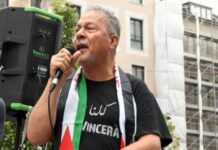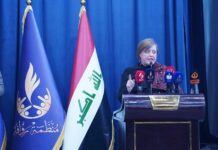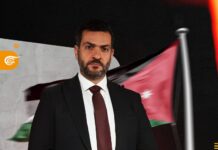
by Jillian Kestler-D’Amours of the Electronic Intifada
Odeh vomited after Israeli police punched him four times in the stomach on his way to his prison cell. Odeh’s calm demeanor, only days after his ordeal, was evidence of how this was his tenth arrest in three years.
More shocking, however, is the fact that this resident of Silwan in East Jerusalem is only 12-years-old. “I miss my house,” Odeh told The Electronic Intifada, as he stared longingly from the balcony of his uncle’s home — where he is under house arrest until next Wednesday, 24 October — onto his family’s house below.
“I don’t feel comfortable. I miss my friends, my grandmother, my mother,” he said. “I don’t know if they will arrest me again.”
House arrest
Muslim Odeh was first arrested at the age of nine. During each arrest, Israeli police have accused him of throwing stones and Molotov cocktails. Today, he is being held under house arrest at his uncle’s home in the East Jerusalem neighborhood of Jabel Mukaber. If he violates the conditions of his release, he will be re-arrested and forced to pay a fine of 5,000 shekels ($1,300).
A group of Israeli riot police entered his home with two dogs, the 12-year-old explained, during the most recent arrest. “I heard dogs near me. I was scared,” he said, adding that, moments later, the police brought him blindfolded to an Israeli police station in East Jerusalem.
There, Israeli interrogators accused him of throwing Molotov cocktails and stones, and asked him about the activities of other children in Silwan. While he wasn’t physically harmed during the interrogation, the main Israeli investigator yelled and forcibly slammed his hand on the table to scare him, Odeh said.
“I said I didn’t do anything,” said Odeh, who was interrogated from 5am until 3pm before being transferred to the notorious Russian Compound (Moskobiye, in Arabic) prison compound in West Jerusalem. There, he was held with six other prisoners who, he said, were Palestinian teenagers from the Shuafat refugee camp.
“I was the youngest in the room, [and] in the whole Moskobiye,” Odeh added.
Child arrests widespread
According to a report released by Save the Children and the East Jerusalem YMCA Rehabilitation Program in March, the Israeli authorities have arrested and detained over 8,000 Palestinian children in the West Bank and East Jerusalem since 2000 (“The impact of child detention: Occupied Palestinian Territory,” March 2012).
The report found that most of the children were handcuffed and blindfolded during their arrest — which was most often carried out on suspicion that the children threw stones — and that they were almost always interrogated and held without access to a lawyer or their parents.
Nearly all children (98 percent) were subjected to physical or psychological violence during their arrest and detention, the report found, and 90 percent of children suffered from post-traumatic stress disorder.
“Children were subjected to isolation and ill-treatment; many developed a fear of dogs used for searching. They suffered from nightmares, sleeping and eating disorders, bedwetting, and feared re- arrest or acquired unhealthy habits such as smoking,” the report stated.
Addameer, the Ramallah-based Palestinian prisoners’ support and human rights association, has reported that as of 1 September this year, some 194 Palestinian children were held in Israeli detention centers, including 30 below the age of 16 (“Key Issues: Children,” Addameer website).
“Forms of ill-treatment used by the Israeli soldiers during a child’s arrest and interrogation usually include slapping, beating, kicking and violent pushing. Palestinian children are also routinely verbally abused. Despite recommendations by the UN Committee Against Torture in May 2009 that the interrogations should be video recorded, no provisions to this effect have yet been enacted,” Addameer found.
“Cosmetic” changes
In July 2009, Israel created a juvenile military court system for Palestinian minors from the West Bank and East Jerusalem. After decades of trying Palestinians over 16-years-old as adults — in violation of the UN Convention on the Rights of the Child, which defines children as anyone 18 and under — Israel also recently began treating all Palestinians under 18 as children.
But according to Khaled Quzmar, legal advisor at Defence for Children International-Palestine Section (DCI), these changes are nothing more than “cosmetic” and haven’t really changed the overall system of oppression.
“Israel marketed [these changes to] the world as applying international human rights law and [that] they are going to stop prosecuting children in the Israeli military courts. In fact, on the ground, the same court and the same judges [are in place],” Quzmar told The Electronic Intifada. “In fact, nothing changed. The same campaigns of arrests continued.”
DCI has found that despite putting juvenile courts in place, Israel still treats Palestinian children as adults when it comes to sentencing, bail applications and how long detainees can be denied access to a lawyer, which is set at 90 days for both adults and children (“Children prosecuted in Israeli military courts,” 2 October).
Quzmar added that the arrests of Palestinian children aim to deter resistance to Israeli occupation policies, and in some cases, force families to leave their homes and villages altogether.
“They put pressure on the families by arresting their children or targeting their children, so maybe this policy will force the families to leave the area. This policy is very clear in Jerusalem. The courts used to sentence the children deport the children from their houses so it is a kind of transfer,” he said.
For 12-year-old Muslim Odeh, the psychological impact of his many arrests has been difficult. “I have nightmares,” Odeh said. “Sometimes I dream that the police are coming to take me, but then I wake up to see that I’m not in prison but in my house.”
Jillian Kestler-D’Amours is a reporter and documentary filmmaker based in Jerusalem. More of her work can be found at
Discover more from Samidoun: Palestinian Prisoner Solidarity Network
Subscribe to get the latest posts sent to your email.




